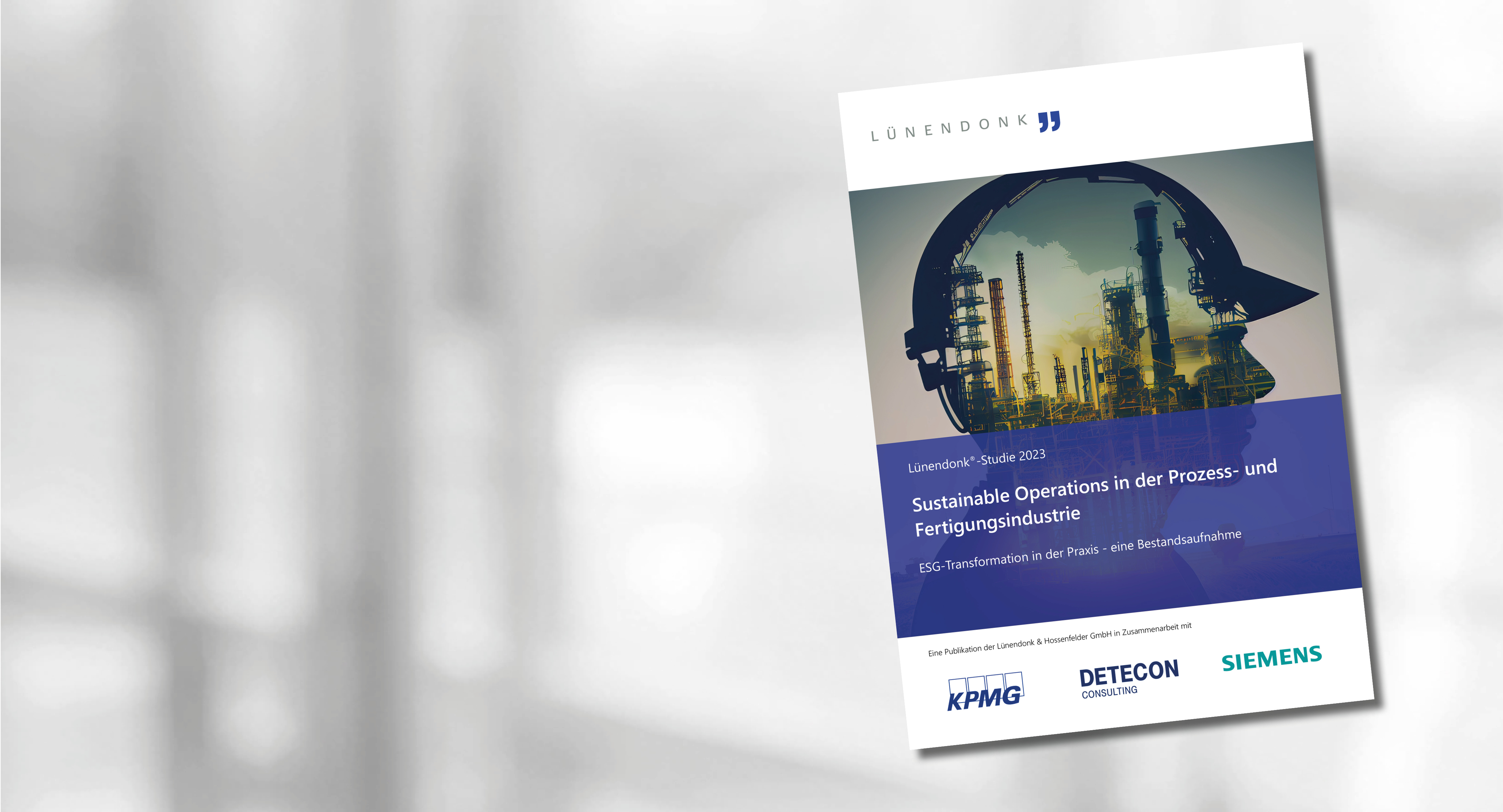It could be so simple, but it's not. Digitization does not automatically make a company more sustainable. For example, data centers now consume three percent of the world's electricity, and Internet of Things (IoT) devices alone could amount to up to 3.1% of global electricity consumption by 2026 - the trend is clearly upward. And in 2021, almost 58 million tons of e-waste were generated worldwide. So, what can companies do to get the combined benefit of both the megatrends: digitization and sustainability? Utilize the power of digitainability enabled with data intelligence!
(Excerpt from the article of the same name by Dr. Shivam Gupta in the (German-language) Lünendonk study "Sustainable Operations in the Process and Manufacturing Industry")
The topic of sustainability is increasingly evolving from "can do" to "must have" status. Not only because regulatory requirements such as the EU's Corporate Sustainability Reporting Directive (CSRD) or the German Supply Chain Act are forcing companies to produce and act more sustainably. Rather, current studies show that sustainability has become an economically relevant and competitively differentiating factor.
The PAC study "IT & Sustainability - Maturity Index 2023," published in May 2023, for example, shows that 94 percent of the 150 IT and business decision-makers surveyed from medium-sized manufacturing and logistics companies produce or plan to produce a sustainability report. According to their own statements, half of them do so without regulatory pressure. Similar studies confirm that the topic of sustainability has left its niche existence and is now a mainstream transformation.
Make Sustainability tangible with the data!
But how can sustainability strategies be implemented? To this end, companies are increasingly turning to digitization for help. But IT alone is not enough because power consumption, equipment manufacturing, logistics, and electronic waste can all have a negative impact on the eco-balance. The opportunities lie in the data. It can be used to identify, understand, and validate the initial hypotheses for drawing conclusions to develop a more sustainable business. But until now, companies have mainly used the technologies to optimize and automate business processes - and reduce costs. Even if this reduces the carbon footprint as a side effect, the data-driven coherent strategy provides the basis for digitalization and sustainability to go hand in hand.
But why do companies find it so difficult to make their processes more sustainable? For years, there have been well-known and applied process models, such as the American Process Quality Framework (APQC), which can also be helpful to enable the topic of sustainability processes. By mapping the framework's processes thematically and identifying interlinkages, we notice that, for example, if companies consider sustainability from the customer's perspective, it will inevitably influence various areas of business operations, including purchasing, logistics, production, products, and sales. It shows how few sustainability efforts can influence various interlinked processes for a sustainable business. For that to happen, it is important to identify those low-hanging opportunities in overall business processes which can lead to cascading transformation. Data and connectivity of technologies is the key here!
Carbon Enablement Potential Evaluation
So how can companies specifically use digitainability and its capabilities to collect and evaluate data from a sustainability perspective considering such business frameworks? Example 5G installation. What sustainability gains can be achieved with a private 5G network along with economic gains? And this is where data intelligence capability of digitainability comes into play. Detecon has developed the "Carbon Reduction Enablement Framework" to evaluate this. It makes it possible to evaluate the carbon footprint of the existing business processes and infrastructure to find out what effects the switch to a new technology like 5G will have. Or how much carbon can be saved, or resource efficiency can be achieved if a company plan to use Google Cloud or Azure. By utilizing the data intelligence capabilities of digitainability businesses can decide on the green practices, green procurement and relevant sustainability effort which can support green digital twin transformation.
If a company previously used only Wi-Fi, employees on the floor would be limited to the number of devices and speed along with the proximity of the Wi-Fi coverage. Let's assume that if they switch to 5G, many devices could be securely connected, and data would be transmitted faster. For example, this could enable cameras with new capabilities to reshape the logistical processes and could create a high-resolution 3D model of storage spaces because of better data transmission and seamless connectivity, therefore creating more intelligent business processes than with Wi-Fi. Then, various tedious repetitive operations for instance in the quality check, fault detection and inventory management could be easily optimized and foster better resource utilization. Primarily the business benefit directly by the ICT and process infrastructure change and its related carbon emissions. Secondarily, operational benefit led to lean processes specifically designed to eliminate waste, minimize unnecessary resource usage, and optimize overall dependent efficiency, which ultimately reduces operational costs and environmental impact. Model calculations show that in a company, this can reduce tens of tons of CO2 emissions at a single facility alone.







